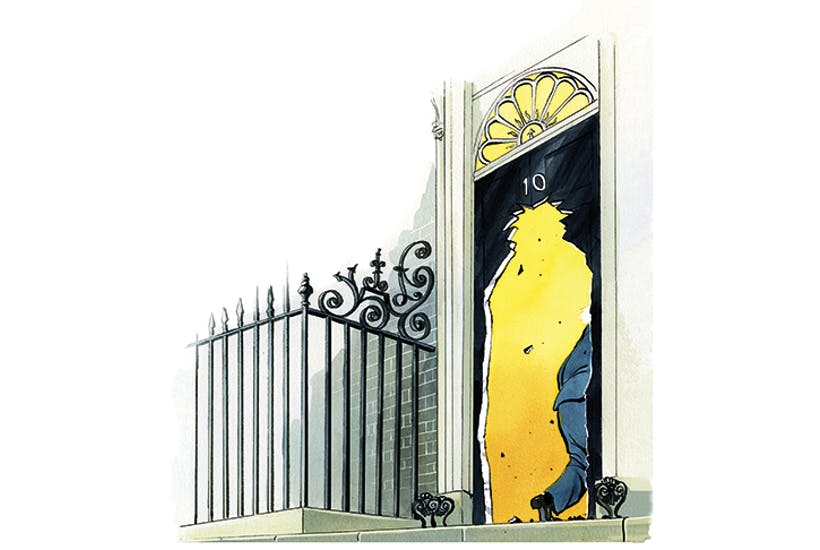Imagine. About ten years ago, you are a publisher or a TV commissioning editor and someone comes to you with a bright idea. They want to write about a gallivanting scapegrace who has found his way into politics. A fellow who combines the seriousness of Bertie Wooster with the morals of Donald Trump; a strolling player who seems to hold the pieties of middle Britain in cheerful contempt – he is certain to add to the gaiety of nations.
But that does not do justice to his ambitions. They go well beyond clowning. This jackanapes wants to be Prime Minister. That means attracting the support of Tory party members, the sort of people who put the ‘small’ into small-c Conservative. He not only does it: he wins two-to-one. Via Buckingham Palace, the proposal ends with the jester arriving in Downing Street.
If you had received such a proposal, your response would have been predictable. ‘Even a BBC comedy about the Tories requires some verisimilitude. This has none, Take it away.’
You would have been wrong. Almost everyone would have been wrong. We seem to live in an era where the unthinkable regularly becomes the common-place: in a world with an acrobat’s ability to turn itself upside down. A country where Ireland bowls out England for 85, and where Boris Johnson becomes Prime Minister.
We now have to move beyond incredulity to analysis. What sort of Prime Minister will Boris be? What will British politics look like in four months’ time? The potential volatility and with it, the range of conceivable outcomes, is frightening.
First, it is possible that Boris could make a deal, find a way of kicking the Irish backstop into the long grass, and leave the EU on time. In that case, British politics would be transformed. After Brexit, the roof would not fall in. With uncertainty removed, a lot of the growth and investment now lurking in the pipeline would move into the economy. The Tories could reclaim the politics of aspiration, Housing and the property-owning democracy would return to the top of the party’s agenda, transforming it into an election-winning one, especially if Labour were still stuck with Jeremy Corbyn.
Second, Johnson could fail to negotiate a deal and the Commons find it impossible to prevent his leaving without one. A number of Tories think about bringing down the Government – and then think again. The thought of delivering power to Corbyn chills their blood. Then, the same good news aspiration scenario unfolds.
There are worse outcomes. The Government does fall and we are into an election. If that includes a deal with Nigel Farage, Boris could win, but would lose a lot of liberal Tories: the equivalent of the Peelites’ departure after 1846. That would gravely weaken the party. If there were an election without a Farage deal, it would end in a shambles. Farage on one flank, the Liberals on the other; the outcome would be a chaotic Parliament and probably a Corbyn minority government followed by a second referendum.
What about a second referendum? My guess is that Boris will resist any move to call one. Recent events have strengthened his self-confidence, so that he believes in his election-winning powers. That is how he is behaving.
The reshuffle – or, rather, reconstruction – certainly indicates no lack of self-belief. There are two Borises: the goofy character who wants to be loved and the steely one who will let nothing come between him and his ambition. On Wednesday, the latter won. The gutters of Downing Street flowed with ministerial blood: some of it unfairly shed. Penny Mordaunt was doing well at Defence. She is a patriot, whose heart swells with pride when she thinks of the armed forces. Her departure means that we are on the fourth Defence Secretary in three years. If a senior military command were chopped and changed like that, everyone would think that it was a poor show. Everyone would be right. Ben Wallace, who got the job, will do well. But he could have gone to Northern Ireland.
Equally, Mel Stride was making a good start as a Cabinet minister, he would have been a clever choice to make sense of Universal Credit. His dismissal was inexplicable. So were some of the appointments. Priti Patel has few brains, less judgment and no political self-knowledge. Home Secretary? That defies belief. So does a recall for Theresa Villiers. Her ministerial record was one of mediocrity tinged by failure. At the Environment she will have to cope with a mob of eco-loonies and green socialists who are succeeding in banishing common-sense from the debate. She will not be able to put that right. There was no point in recalling her to fail again.
It was never likely that any Boris political project would be universally applauded. As long as he is PM, the ‘fasten seat belts’ sign will never be switched off. But it would be foolish to assume that he will inevitably crash the plane.






Comments